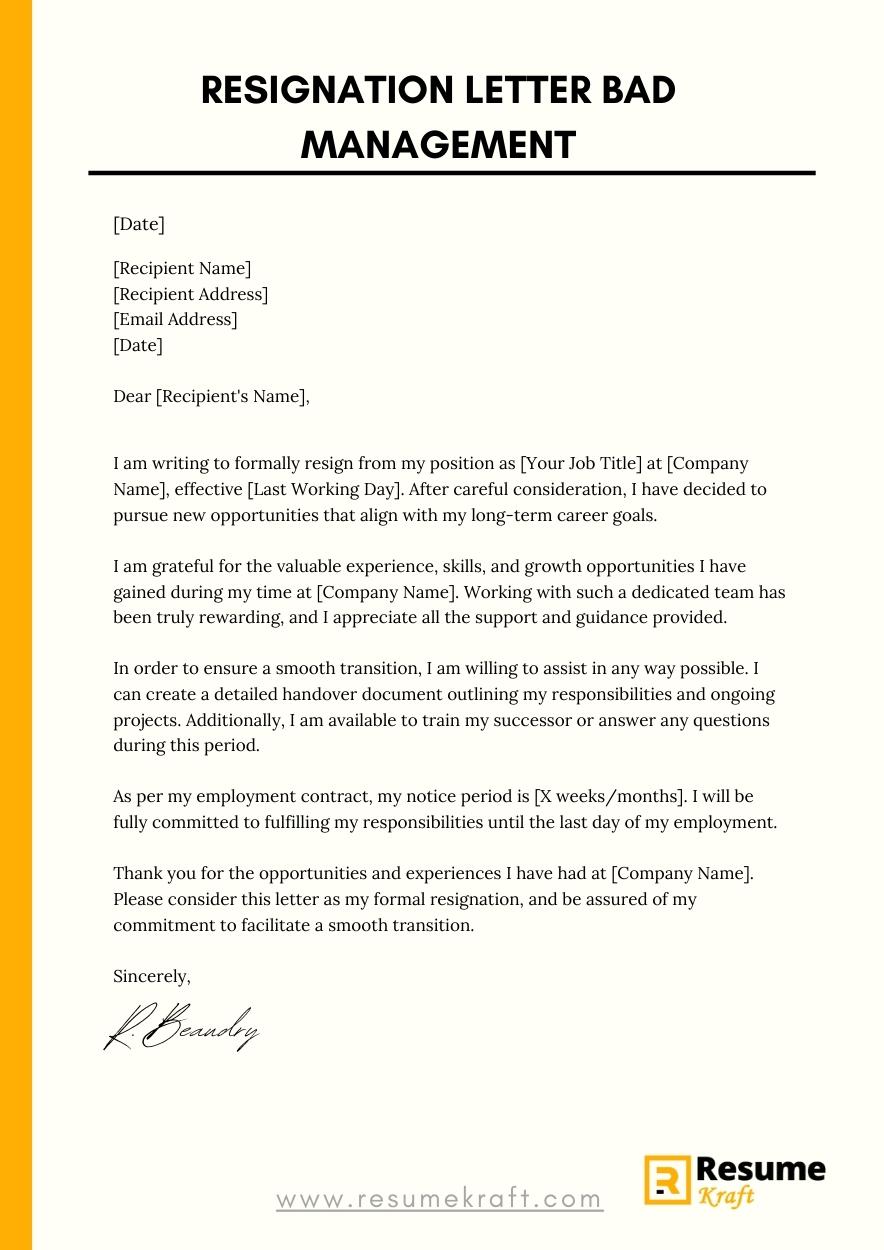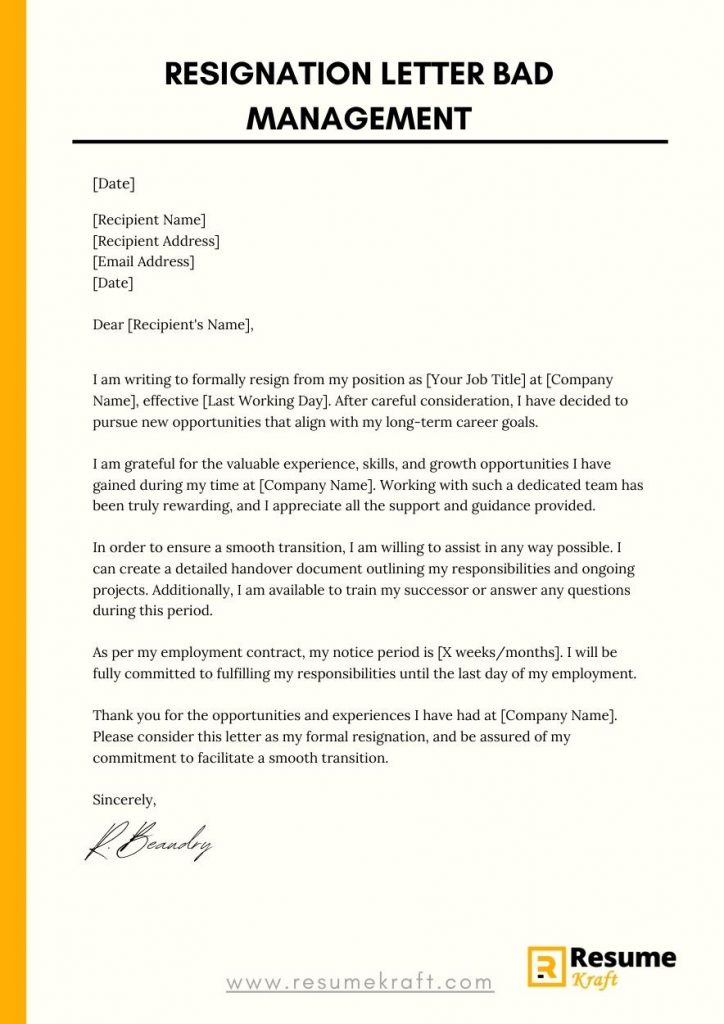
Are you facing a challenging work environment with bad management? It can be incredibly frustrating and demoralizing to work under such conditions. Sometimes, the best solution is to move on to better opportunities. However, it’s important to leave on a positive note and maintain your professionalism. One way to do this is by writing a well-crafted resignation letter. In this article, we will guide you through the process of writing a resignation letter specifically when dealing with bad management. We will provide you with samples and examples to help you effectively communicate your decision while maintaining your dignity.
What To Include in a Resignation Letter
A resignation letter serves as a formal record of your decision to leave a company. It should be professional, concise, and respectful. When writing a resignation letter in the context of bad management, consider including the following elements:
1. Express Your Decision Clearly
Clearly state your intention to resign from your position. Avoid being vague or leaving room for misinterpretation. Make it clear that your decision is final and that you have carefully considered your options.
2. Provide a Reason (Optional)
While not necessary, providing a brief explanation for your resignation can be helpful. However, when dealing with bad management, it’s important to tread carefully and avoid being overly critical or confrontational. Focus on personal growth, career advancement, or a desire for a more positive work environment.
3. Show Gratitude and Appreciation
Express your gratitude for the opportunities you’ve had, the skills you’ve acquired, and the experiences you’ve gained during your time with the company. Highlight any positive aspects of your tenure, such as professional growth or successful projects.
4. Offer Assistance in the Transition
Demonstrate your professionalism by offering to assist with the transition process. This could include creating a comprehensive handover document, training a successor, or providing important contacts and information.
5. Discuss the Notice Period
Clarify the notice period you are willing to provide, as outlined in your employment contract or company policy. This allows the employer to plan for your departure and find a replacement if necessary.
6. End on a Positive Note
Conclude your resignation letter on a positive and optimistic tone. Wish the company and your colleagues well and thank them once again for the opportunities and experiences you’ve had.
What Not to Include in Your Resignation Letter
When dealing with bad management, it’s important to approach your resignation letter with professionalism and tact. Avoid including the following in your letter:
- Negative Remarks: Refrain from making negative comments about the company, your colleagues, or your supervisors. It’s important to maintain a positive tone throughout the letter; criticism is best left for exit interviews or private discussions.
- Personal Attacks or Blame: Resist the temptation to blame specific individuals for the negative work environment. Instead, focus on your own career goals and personal growth as the driving force behind your decision to resign.
- Emotional Venting: Keep your emotions in check. While it’s natural to feel frustrated or angry, it’s important to maintain a cool, composed, and professional demeanor in your resignation letter.
- Threats or Ultimatums: Avoid making threats or giving ultimatums in your resignation letter. These types of statements can burn bridges and harm your professional reputation.
- Excessive Detail: Keep your resignation letter concise and to the point. Avoid going into excessive detail about the reasons for your departure or any negative incidents you’ve experienced.
Remember, the purpose of a resignation letter is to formally communicate your decision to leave in a professional manner.
How To Format a Resignation Letter
Now that you know what to include and what not to include in your resignation letter, let’s discuss how to format it properly. Follow these guidelines to ensure a professional and well-structured letter:
- Contact Information: Include your full name, address, phone number, and email address at the top of the letter. This should be followed by the date.
- Recipient Information: Below the date, include the recipient’s name, job title, and company address. If you have a direct supervisor or manager, address the letter to them. If not, address it to your HR department or the relevant person responsible for processing resignations.
- Salutation: Begin your letter with a formal salutation, such as “Dear [Recipient’s Name].” If you have a good relationship with the recipient, you may use their first name instead of their title.
- Introduction: Start your letter with a clear and direct statement indicating your intention to resign. For example, “I am writing to formally resign from my position as [Your Job Title] at [Company Name], effective [Last Working Day].”
- Reason for Resignation (Optional): If you choose to include a brief explanation for your resignation, state it in a respectful and neutral manner. Emphasize your personal and professional goals rather than criticizing the management. Keep this section concise and focused.
- Express Gratitude: Use the next paragraph to express your gratitude for the opportunities and experiences you’ve had during your tenure with the company. Highlight the positive aspects of your time there, such as skills acquired and professional growth.
- Offer Assistance: Show your professionalism by offering to assist with the transition process. Specify the ways in which you can be of help, such as creating a transition plan or training a successor. Make it clear that you are willing to facilitate a smooth handover.
- Notice Period: State the notice period you are willing to fulfill, as per your employment contract or company policy. This allows the company to make appropriate arrangements and find a replacement if necessary.
- Closing: Conclude your letter on a positive note. Reiterate your gratitude, wish the company and your colleagues continued success, and express your hope for maintaining positive relationships in the future.
- Signature: End the letter with a professional closing, such as “Sincerely” or “Best regards.” Sign your name and type your printed name below your signature.
[Type of] Resignation Letter Samples
To help you further, here are two resignation letter samples – one in a printed format and the other in an email format.

Printed Resignation Letter Sample:
[Your Name]
[Your Address]
[City, State, ZIP Code]
[Phone Number]
[Email Address]
[Date]
[Recipient’s Name]
[Recipient’s Job Title]
[Company Name]
[Company Address]
[City, State, ZIP Code]
Dear [Recipient’s Name],
I am writing to formally resign from my position as [Your Job Title] at [Company Name], effective [Last Working Day]. After careful consideration, I have decided to pursue new opportunities that align with my long-term career goals.
I am grateful for the valuable experience, skills, and growth opportunities I have gained during my time at [Company Name]. Working with such a dedicated team has been truly rewarding, and I appreciate all the support and guidance provided.
In order to ensure a smooth transition, I am willing to assist in any way possible. I can create a detailed handover document outlining my responsibilities and ongoing projects. Additionally, I am available to train my successor or answer any questions during this period.
As per my employment contract, my notice period is [X weeks/months]. I will be fully committed to fulfilling my responsibilities until the last day of my employment.
I want to express my best wishes for the continued success of [Company Name]. I have enjoyed working with each and every one of my colleagues and I hope our paths cross again in the future.
Thank you for the opportunities and experiences I have had at [Company Name]. Please consider this letter as my formal resignation, and be assured of my commitment to facilitate a smooth transition.
Sincerely,
[Your Signature]
[Your Printed Name]
Email Resignation Letter Example:
Subject: Resignation – [Your Name]
Dear [Recipient’s Name],
I hope this email finds you well. I am writing to formally resign from my position as [Your Job Title] at [Company Name], effective [Last Working Day]. After careful consideration, I have decided to pursue new opportunities that are more aligned with my long-term career goals.
I would like to express my sincere gratitude for the support, opportunities, and professional growth I have experienced during my time at [Company Name]. I have had the privilege of working alongside a dedicated team, and it has truly been an invaluable experience.
In order to ensure a seamless transition, I am more than willing to provide any assistance necessary. Whether it be creating a comprehensive handover document or training my successor, I am committed to making this transition period as smooth as possible.
According to my employment contract, my notice period is [X weeks/months]. I will fulfill my responsibilities during this time to the best of my ability.
I want to take this opportunity to extend my best wishes for the continued success of [Company Name]. It has been a pleasure working with each and every one of my colleagues, and I hope our paths cross again in the future.
Thank you for your understanding and support. Please consider this email as my formal resignation, and feel free to reach out if you require any further information or assistance.
Best regards,
[Your Full Name]
[Your Contact Number]
[Your Email Address]
Key Takeaways
- When resigning due to bad management, maintain a professional and respectful tone.
- Clearly express your decision to resign and, optionally, provide a brief explanation.
- Show gratitude for the opportunities and experiences gained during your tenure.
- Offer assistance in the transition process to ensure a smooth handover.
- Follow proper formatting guidelines, both for printed and email resignation letters.
By following these guidelines and using the provided samples as a reference, you can craft a well-written resignation letter that effectively conveys your decision to leave while maintaining a positive and professional approach. Remember, resigning from a job with bad management can be a step towards a better future for yourself.
Frequently Asked Questions (FAQs)
1. Can I be completely honest about the reasons for my resignation in the letter?
While it may be tempting to express your frustrations and be completely honest about the reasons for your resignation, it’s generally best to maintain a professional and respectful tone. Focus on your own personal growth and career goals rather than criticizing the management.
2. Should I mention specific incidents or instances of bad management in my resignation letter?
It’s generally not advisable to mention specific incidents or instances of bad management in your resignation letter. This letter is not the appropriate platform for airing grievances or making accusations. Save those discussions for private conversations or exit interviews.
3. Is it necessary to provide a notice period when resigning due to bad management?
Yes, it is important to adhere to the notice period outlined in your employment contract or company policy. This shows professionalism and allows the company to plan for your departure and find a replacement if needed.
4. Can I ask for a reference or recommendation in my resignation letter?
It’s best to request a reference or recommendation separately, either in person or via email, after your resignation has been accepted. This ensures that your main focus in the resignation letter is on the decision to resign and the transition process.
5. How should I address my resignation letter when there is no specific name or contact person?
If you don’t have a direct supervisor or manager to address your resignation letter to, address it to the HR department or the relevant person responsible for processing resignations. Use a generic salutation such as “Dear HR Manager” or “To Whom It May Concern.”
Conclusion
Resigning from a job due to bad management can be challenging, but writing a well-crafted resignation letter will help you leave on a positive note. Remember to express your decision clearly, offer assistance in the transition, and maintain a professional and respectful tone. By following the guidelines and utilizing the provided resignation letter samples, you can confidently communicate your resignation while preserving your dignity and professionalism.

